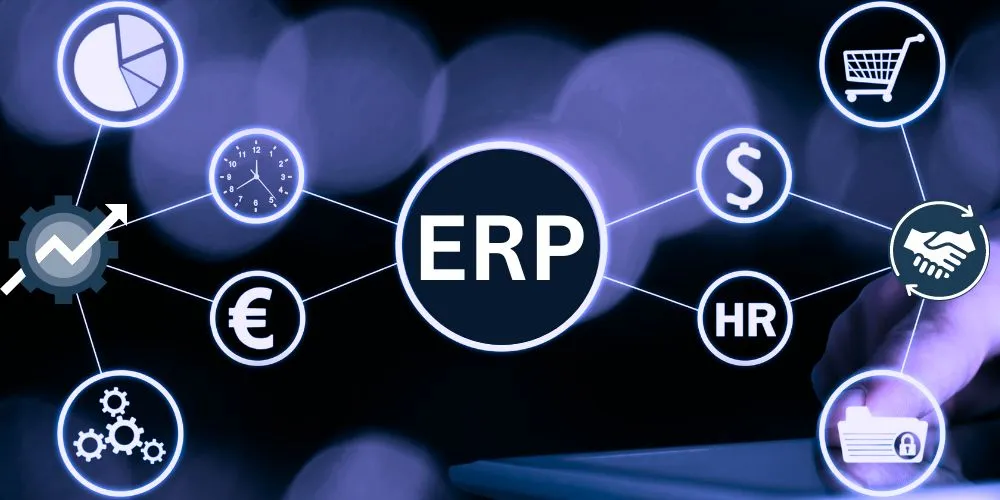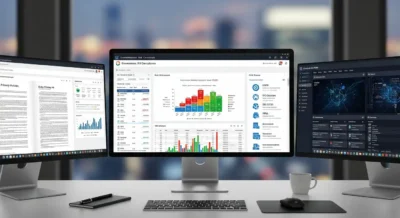Enterprise Resource Planning systems have revolutionized how organizations manage and integrate their core business processes. In this article, we will explore the concept of ERP, its importance, applications, benefits, limitations, and market value.
What is Enterprise Resource Planning?
Enterprise Resource Planning (ERP) is a comprehensive and integrated software system enabling organizations to streamline and automate their business processes. It serves as a centralized platform that facilitates the management of various functions, including finance, human resources, supply chain, manufacturing, customer relationship management (CRM), and more.
The primary goal of an ERP system is to provide a unified view of an organization’s data and operations, enabling efficient decision-making, resource allocation, and overall improvement in productivity and profitability. It replaces disparate and fragmented legacy systems, eliminating data silos and promoting seamless data flow across different departments and functions.
Importance of Enterprise Resource Planning
The importance of enterprise resource planning in modern business environments cannot be overstated. Here are some key reasons why organizations consider implementing an ERP system.
Streamlined Operations
ERP systems combine business functions and processes into a single, integrated platform. This integration eliminates redundant data entry, improves data accuracy, and enables real-time visibility into the organization’s operations, leading to streamlined and efficient processes.
Enhanced Collaboration
Enterprise resource planning systems foster collaboration and communication across various departments and teams. Employees can easily share information, collaborate on projects, and work towards common goals by providing a centralized database and collaboration tools.
Data-driven Decision Making
An ERP system allows organizations to access accurate and up-to-date data across the business. It enables informed decision-making at all levels, as managers can analyze trends, identify opportunities, and address challenges based on real-time data insights.
Improved Customer Satisfaction
The systems allow organizations to manage customer interactions and relationships better. By integrating CRM functionalities, organizations can track customer interactions, organize sales pipelines, and provide personalized customer experiences, improving customer satisfaction and loyalty.
Regulatory Compliance
Compliance with industry regulations and standards is critical for many organizations. Enterprise resource planning systems often include built-in compliance features and reporting capabilities, ensuring adherence to legal and regulatory requirements.
Applications of Enterprise Resource Planning
Enterprise resource planning systems find applications across various industries and sectors. Here are some common areas where ERP is widely utilized.
Finance and Accounting
ERP systems provide robust financial management capabilities, including general ledger, accounts payable and receivable, budgeting, and financial reporting. They enable organizations to efficiently manage financial transactions, monitor cash flows, and generate accurate financial statements.
Human Resources
The systems often include modules for managing employee information, payroll, benefits administration, attendance tracking, and performance management. These modules streamline HR processes, automate routine tasks, and centralize employee data, enabling HR departments to focus on strategic initiatives.
Supply Chain Management
ERP systems facilitate end-to-end supply chain management, encompassing procurement, inventory management, demand planning, order fulfillment, and logistics. Organizations can reduce costs, improve efficiency, and ensure timely delivery of products or services by optimizing supply chain processes.
Manufacturing and Production
The software solution offers comprehensive production planning, scheduling, and control functionalities. They enable organizations to optimize manufacturing processes, track production costs, manage inventory levels, and ensure smooth coordination between manufacturing units.
Customer Relationship Management
Many ERP systems include Customer Relationship Management (CRM) modules that help organizations manage customer interactions, track sales leads, automate marketing campaigns, and provide customer support. These functionalities enhance customer satisfaction, enable targeted marketing efforts, and drive sales growth.
Benefits of Enterprise Resource Planning
Implementing an enterprise resource planning system can yield several benefits for organizations. Here are some key advantages.
Process Efficiency
Implementing ERP systems can greatly benefit businesses by eliminating the need for manual processes, reducing duplication of effort, and automating routine tasks. This results in improved operational efficiency and a reduction in administrative overhead. By streamlining workflows and providing real-time data, ERP systems help organizations make informed decisions and react quickly to changes in the market. With these benefits, companies can focus on growth and innovation rather than spending valuable time on tedious administrative tasks.
Data Integration and Accuracy
One of the key benefits of implementing ERP systems is that they help businesses centralize their data in a single database, which means that the data is consistent and accurate, which enables organizations to make informed decisions based on reliable information. With enterprise resource planning systems, businesses can eliminate the need for manual processes, reduce duplication of effort, and automate routine tasks. It improves operational efficiency and reduces administrative overhead, freeing up valuable time for growth and innovation. Moreover, by streamlining workflows and providing real-time data, ERP systems help organizations react quickly to changes in the market, making them more agile and competitive. ERP systems are crucial for modern businesses that want to stay ahead of the curve.
Cost Savings
Implementing ERP systems can result in significant cost savings for businesses. Enterprise resource planning systems can reduce time and effort by optimizing business processes and increasing productivity and efficiency. The software solutions can also help reduce inventory carrying costs by providing real-time data on stock levels and demand, allowing businesses to manage their inventory more effectively. By eliminating redundant systems, companies can save money on maintenance and support costs while improving overall resource utilization, reducing energy costs, and lowering waste. ERP solutions can be an excellent investment for businesses looking to increase their bottom line and improve operations.
Scalability and Flexibility
As businesses grow, their needs and demands change. The data volumes, user counts, and transactional demands all increase, and businesses require systems that can keep up with these changes. ERP systems are designed to scale with businesses, ensuring the system remains aligned with organizational needs. It means that as the company grows and changes, the system can accommodate the increasing demands and data volumes without significant disruptions to business operations. By using an ERP system, businesses can have the peace of mind that the system will continue to meet their needs, even as they grow and change over time.
Competitive Advantage
Enterprise resource planning systems are essential for businesses seeking a competitive edge in the market. By streamlining operations, ERP systems enable organizations to optimize their processes, reduce costs, and increase efficiency. With enhanced collaboration capabilities, teams can collaborate more effectively, sharing real-time data and insights. The solution enables businesses to make more informed decisions, improve their products and services, and improve customer satisfaction. By leveraging the power of ERP systems, companies can stay ahead of the curve and respond swiftly to changing business dynamics, ensuring they remain relevant and successful in the long run.
Limitations of Enterprise Resource Planning
While enterprise resource planning systems offer numerous benefits, it’s also important to consider their limitations. Here are some common challenges associated with ERP implementation.
Implementation Complexity
Implementing an ERP software system can be a complex and resource-intensive process. It requires careful planning, extensive customization, data migration, and employee training, which can contribute to project delays and increased costs.
Customization Challenges
ERP systems often require customization to align with specific business processes. However, excessive customization can make the system difficult to upgrade and maintain, potentially leading to compatibility issues and increased complexity.
Change Management
Adopting an enterprise resource planning system often necessitates organizational processes and employee workflow changes. Resistance to change and lack of user adoption can hinder the successful implementation and utilization of the system.
High Upfront Costs
The initial investment required for implementing an ERP system, including software licenses, hardware infrastructure, and consulting services, can be significant, especially for small and medium-sized enterprises.
Vendor Dependency
Organizations implementing enterprise resource planning systems become dependent on the vendor for ongoing support, updates, and system maintenance. This dependency raises concerns about vendor stability, responsiveness, and potential vendor lock-in.
Market Value of Enterprise Resource Planning
The global enterprise resource planning market has experienced substantial growth in recent years, driven by the increasing need for operational efficiency and digital transformation. According to Grand View Research market research, the global ERP market was valued at USD 54.76 billion in 2022 and is expected to reach USD 123.41 billion by 2030, growing at a compound annual growth rate (CAGR) of 11.0% during the forecast period from 2023 to 2030.
Key Companies in the ERP Market
The enterprise resource planning market is highly competitive, with several key players dominating the industry. Here are some prominent ERP vendors.
- SAP SE: SAP offers various ERP solutions tailored for multiple industries, including SAP S/4HANA, SAP Business One, and SAP ERP.
- Oracle Corporation: Oracle provides comprehensive ERP solutions, such as Oracle ERP Cloud and NetSuite, catering to organizations of all sizes.
- Microsoft Corporation: Microsoft offers Microsoft Dynamics 365, a suite of ERP and CRM applications that integrate seamlessly with other Microsoft products.
- Infor: Infor provides industry-specific ERP solutions designed to address the unique needs of different sectors, including manufacturing, healthcare, retail, and more.
- Epicor Software Corporation: Epicor offers ERP solutions targeting manufacturing, distribution, and retail industries, empowering organizations to drive growth and productivity.
Conclusion
Enterprise resource planning systems have become indispensable tools for organizations seeking to streamline operations, improve efficiency, and achieve sustainable growth. By integrating various business functions into a unified platform, ERP systems enable organizations to make informed decisions, enhance collaboration, and meet customer expectations effectively. While enterprise resource planning implementation poses certain challenges, the benefits outweigh the limitations, making it a valuable investment for organizations across industries. With the ERP market poised for continued growth, businesses can leverage these systems to drive innovation, gain a competitive advantage, and navigate the complexities of the modern business landscape.













